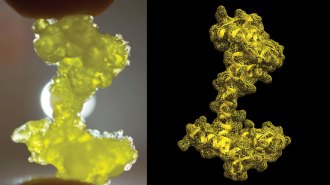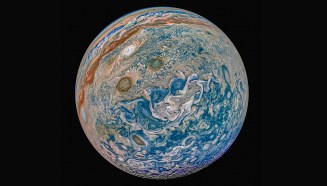Search Results for:
Skip to resultsCan’t find what you’re looking for? Visit our FAQ page.
112,916+ results for:
-
 Astronomy
AstronomySome fast radio bursts come from the spiral arms of other galaxies
Tracking five brief, bright blasts of cosmic radio waves to their origins suggests their sources form quickly in regions with lots of star formation.
-
 Health & Medicine
Health & MedicineHere’s what we know about the risks of serious side effects from COVID-19 vaccines
Allergic reactions, blood clots and possibly heart problems are rare and their risks don’t outweigh the benefits of getting vaccinated, experts say.
-
 Animals
AnimalsThe teeth of ‘wandering meatloaf’ contain a rare mineral found only in rocks
The hard, magnetic teeth of the world’s largest chiton contain nanoparticles of santabarbaraite, a mineral never seen before in biology.
-

-

When Science News readers talk, we listen
Editor in chief Nancy Shute discusses the wonderful feedback we receive from our readers.
By Nancy Shute -
 Chemistry
ChemistryA sweet father-son bond inspires tasty new molecule models
New edible models of proteins could spark students’ interest in the world of chemistry, especially students who are blind.
By Carmen Drahl -
 Planetary Science
Planetary ScienceLaser experiments suggest helium rain falls on Jupiter
Compressing a hydrogen and helium mixture with lasers shows that the two elements separate at pressures found within gas giant planets.
-
 Anthropology
AnthropologyHunter-gatherers first launched violent raids at least 13,400 years ago
Skeletons from an ancient African cemetery bear the oldest known signs of small-scale warfare.
By Bruce Bower -
 Archaeology
ArchaeologyTo find answers about the 1921 race massacre, Tulsa digs up its painful past
A century ago, hundreds of people died in a horrific eruption of racial violence in Tulsa. A team of researchers may have found a mass grave from the event.
-
 Health & Medicine
Health & MedicineHere are answers to 3 persistent questions about the coronavirus’s origins
Calls to double down on investigations into where SARS-CoV-2 came from — nature or a lab accident — are rising as answers remain scarce.
-
 Particle Physics
Particle PhysicsIn a first, neutrinos were caught interacting at the Large Hadron Collider
Despite the LHC’s fame, all its detectors were oblivious to neutrinos. But not anymore.
-
 Climate
ClimateThe last 30 years were the hottest on record for the United States
Typical temps across large swaths of the country are now 1 to 2 degrees Fahrenheit higher than their 20th-century averages.